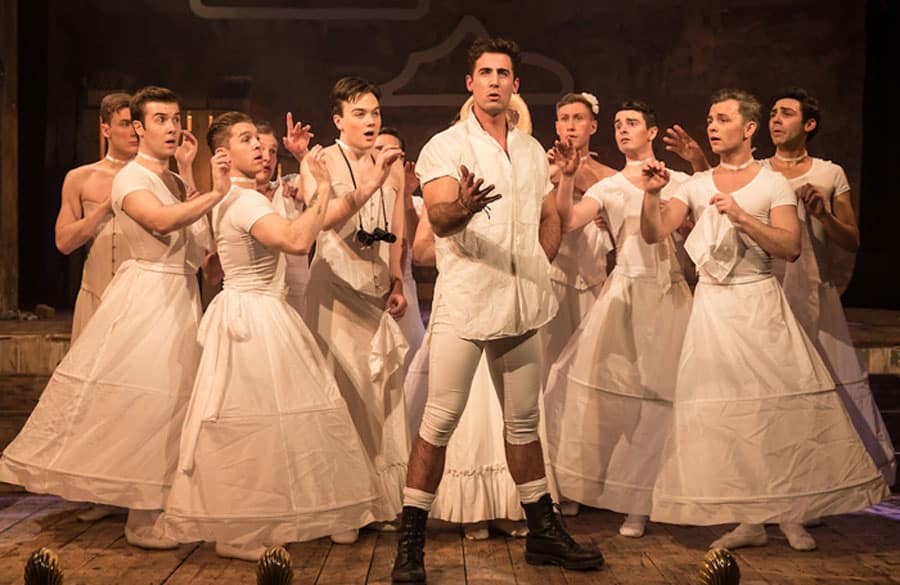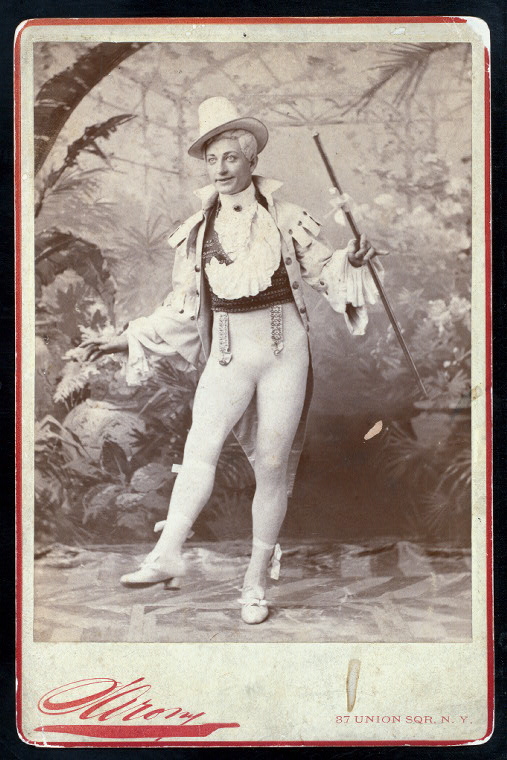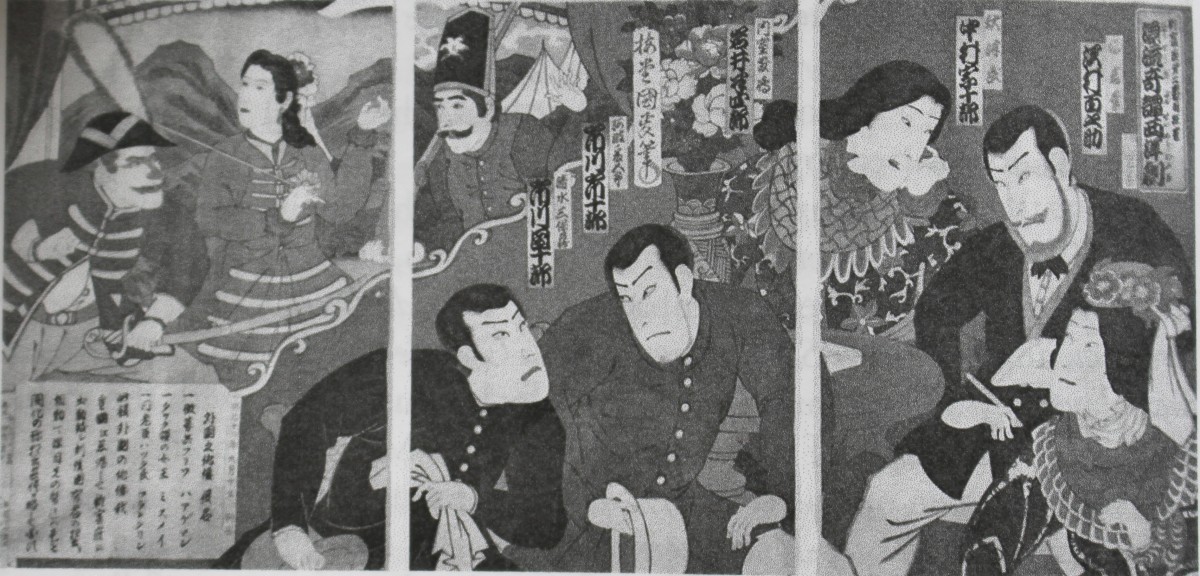Kevin Clarke
Operetta Research Center
30 December, 2020
The gimmick with which the West End revival of Sasha Regan’s Pirates of Penzance at the Palace Theatre was recently sold is this: “all-male.” There have been various all-male Gilbert & Sullivan re-readings by Miss Regan in the past; they have toured the world extensively. These Pirates originally premiered in 2009 at the Union Theatre, moving onto numerous theatres across the UK, plus an Australian tour. I had seen a trailer that looked “delightfully camp,” as Gay Times put it in a review of the re-appearance in London after the Corona lockdown. One of these December 2020 performance has been filmed and is now available for streaming: at 15 pounds a ticket, plus 3 pounds booking fee. This offers a chance to see more than a trailer (or photos) of a Sasha Regan re-imagining of G&S to all those still in lockdown elsewhere.

Advertisement for the December 2020 production of Sasha Regan’s “Pirates of Penzance” at the Palace Theatre, London.
I had been curious about these award-winning all-male versions of classic operettas for a long time, wondering if such a modern-day “burlesque” approach to the genre might bring the long-lost madness and zaniness back, deconstruct gender stereotypes in a way once characteristic for Offenbach, Hervé and Suppé, Strauss and others from the early days of operetta, and maybe lift operetta out of the “twee” harmlessness so often associated with it. In terms of G&S, I hoped, too, that an all-male cast might deliver the witty dialogue and lyrics in a way that shows just how much sexual double entendre there is, despite claims of diehard Savoyards to the opposite.
Friends of mine who had seen this production at the intimate Union Theatre and Wilton’s Music Hall raved about the experience, remembering the atmosphere of the venue as an important extra. And from the photos I saw it must have been magical, indeed.
Here, the minimalist production – consisting of a couple of white boxes on a black empty stage – is seen on the much larger Palace Theatre, you never actually see the auditorium (you only hear it). So it’s a bit like watching the whole show unfold on a dark rehearsal stage, with some off-stage laughter and clapping, and with only a piano playing. Musical Director Richard Baker does a first-rate job moving the music along and keeping the ensembles together; I can’t say I missed a proper orchestra. What I did miss, though, was any kind of fun.

Tom Senior as young Frederick with the daughters of General Stanley, as seen back at Wilton’s Music Hall in a previous staging by Sasha Regan. (Photo: Scott Rylander)
I hesitate calling this a “drag” version of Pirates of Penzance because even though the female characters of the libretto, i.e. Ruth, Mabel and her sisters – are all put into white corsets and/or white frocks, they remain men-in-frocks, no attempt is made to turn them into a “heightened version” of women or, alternatively, a “parody.” With typical fear of saying the “wrong” thing in our current climate of gender debates the aforementioned Gay Times writes: “We did have some reservations that there may be moments where the humour relied on seeing men playing women but this is not the case at all – the female roles are very much presented authentically; the punchline is never that the character is a man in a dress.”
I’m not sure what “authentically” is supposed to mean here, except that these men-in-dresses stay men, put into a dress. There is no particular “humour” about it, and there are no “punchlines” either. Which makes the entire concept of these Pirates worthless. At least for me. (Because the all-male casting adds nothing to the enjoyment of the story, or the story itself.) Add to this Alan Richardson singing the coloratura role of Mabel with a screeching falsetto that made me wish, again and again, I might hear Linda Rondstadt instead. She screeched too as Mabel, but at least she did it with supreme character acting and was ridiculously funny. The same could be said of the Cornish “sisters”: Miss Ronstadt appeared with a bouncy bunch of Broadway belters back in 1980 in Central Park.
In the West End 2020 you get tame falsetto singers who make nothing out of anything, least of all the confrontation with the pirates. There is no erotic (or other) tension between these daughters of Major-General Stanley, certainly no “horror” of being turned into pirate brides. Compare that to the 1980 production where Kevin Kline strides in as a dim-witted super-macho Pirate King who exudes danger and sexual allure; as does his crew. In London you get hunky Oliver Savile as the Pirate King with a gang of equally hunky – yet interchangeable – buccaneers that seem more concerned with their diet and workout routine than any deeper considerations for the story, or G&S.

Tom Senior as Frederick with Alan Richardson (l.) as Mabel and her Cornish sisters, in Sasha Regan’s “Pirates of Penzance,” 2020. (Photo: Screenshot)
Talking of hunks: Tom Senior as young Frederick is put into extra-tight white pants that show off his impressive legs, undoubtedly the result of many gym sessions. He’s quite a sight, and continues the tradition of Henry E. Dixey as Adonis (in skin colored tights back in the late 19th century) with bravura. Sadly, he doesn’t do much else.

Henry E. Dixey in “Adonis,” 1884, photographed by Sarony.
His slender tenor voice moves through the music with ease and naturalness, but he never does anything that might be called remarkable or: an interpretation. Compare him with Rex Smith and the way he once sang “Is there not one maiden’s breast” with rock star bravura (and a heavy dose of Elvis Presley sobbing in the cadenza) and you’ll hear what you’re missing out on. I am sure Mr. Senior could do all of this, if someone had asked him to, either an imaginative music director or an imaginative stage director, or both.
The chemistry between this Mabel and Frederick is virutally non-existant. Is Corona to blame for that? Hardly.
David McKechnie as Major-General Stanley is the only one to bring some extra color to this “bare necessities” staging, by wearing a bright red military jacket for this big patter-song moment, which he delivers riding a scrubbing stick like a horse. He sports impressive facial hair that could have gotten him onto the cover of Breads: An Unshaved History immediately. He too is a dashing sight, but not very comical or otherwise noticeable. And after his “I am the very model” solo in red he runs around for the rest of the show in a white nightgown, carrying a candle in the wind.

David McKechnie as Major-General Stanley in Sasha Regan’s “Pirates of Penzance,” 2020. (Photo: Screenshot)
Add to all of that Leon Craig as Ruth (in white) and Marc Akinfolarin as the Sergeant leading the marching constables (all in white with baby blue coats) for a minimally choreographed chorus line.
Throughout the performance my thoughts drifted back to that 1980 production from Central Park which is so much more “delightfully camp” in a way I find more interesting that using an all-male cast as the only gimmick-that-isn’t-really-a-gimmick. I also thought a lot of the Kabuki versions of Offenbach operettas which Laurence Senelick mentions in his recent book. Presumably, these versions of Grand-Duchess of Gerolstein were also with an all-male cast. I’m sure they found more over-the-top humor in the genre than Sasha Regan does, here, with Pirates of Penzance.

Offenbach’s “Grand-Duchess of Gerolstein” in Japan, in the 19th century. (Photo from Laurence Senelick’s “Jacques Offenbach and the Making of Modern Culture”, Cambridge University Press 2018)
I confess, if I hadn’t paid 15 pounds + booking fee for this stream I probably would have tuned out much earlier, instead of watching till the bitter end just to get my money’s worth. On the plus side, it was a joy to re-visit this wonderful G&S show and be reminded of the many marvellous versions that are available elsewhere. A most ingenious paradox?
Also on the plus side, the diction of all involved here is easy and exemplary, something that is not always the case when opera singers treat G&S like a national monument or a Händel oratory. Maybe the whole thing would work better as a stream if it had been filmed in an atmospheric venue such as Wilton’s Music Hall, filmed in a way that captures the audience interacting with the singers (as was demonstrated recently in the Frau Luna stream from Tipi am Kanzleramt where you saw and felt the audience throughout).

The auditorium of Wilton’s Music Hall. (Photo: Wilton’s Music Hall/Wikipedia)
To watch the revivial of the Sasha Regan production online you need to register for a stream at a specific time, and you can only watch it “live” without fast-forwarding or rewinding, and without a repeat button.
Terry Eastham writes in LondonTheater1, of the live experience in the theater in December 2020: “Overall, this production of The Pirates of Penzance is really charming, energetic, and exuberant and presents the words and music of Gilbert and Sullivan in a way which really does justice to the verbal humour and underlying commentary of the piece. I thoroughly enjoyed the production and left the theatre very happy that my last show of the year had been such good fun.“

“A most ingenious paradox”: the trio Ruth, Pirate King and Frederick in Sasha Regan’s “Pirates of Penzance,” 2020. (Photo: Screenshot)
The Gay Times concludes: “We’re aware that operetta may be an acquired taste and won’t be for everyone – but this is a very entertaining, lighthearted and accessible way to experience it.” So, don’t take my word for any of this, check the production out yourself.
Nightly streams sell until 3 January, for more details click here.
